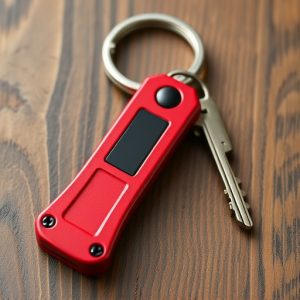Navigating Legal Carry Guidelines for Compact Everyday Carry Keychains
Compact Everyday Carry (EDC) keychain weapons are small, discrete tools for personal safety, offerin…….
Compact Everyday Carry (EDC) keychain weapons are small, discrete tools for personal safety, offering sharp blades or versatile utilities. US states have updated laws to accommodate these devices, defining "defensive keychains" and outlining legal carrying conditions. It's crucial to understand and adhere to local regulations regarding concealed carry permits and restrictions, ensuring safe handling, storage, and discreet use of EDC weapons while prioritizing others' comfort and safety. Legal guidelines vary widely across states, impacting personal safety strategies, with some adopting liberal rules for non-lethal tools while others maintain restrictive requirements. Responsible ownership includes staying informed about state-specific laws, choosing compliant models with safety features, and regularly updating knowledge to adapt to changes in regulations.
“In today’s world, personal safety is a top priority, leading many individuals to explore compact everyday carry keychain weapons as a convenient self-defense option. This article delves into the legal aspects of defensive keychains, offering a comprehensive guide for those seeking to understand and navigate state-specific regulations. From ‘Understanding Compact Everyday Carry Keychain Weapons’ to ‘Best Practices for Navigating Legal Carry Guidelines’, we explore the legal framework, essential considerations, and states with varying laws, ensuring you’re informed about the do’s and don’ts of carrying a defensive keychain.”
- Understanding Compact Everyday Carry Keychain Weapons
- Legal Framework for Carrying Defensive Keychains
- Essential Considerations for Safe and Legal Possession
- States with Liberal vs Restrictive Laws
- Best Practices for Navigating Legal Carry Guidelines
Understanding Compact Everyday Carry Keychain Weapons
Compact Everyday Carry Keychain Weapons are a popular choice for those seeking personal safety in a discreet and convenient form factor. These tiny tools pack a punch, offering a simple yet effective means of self-defense in various situations. The appeal lies in their compactness, allowing users to carry them effortlessly on keys, purses, or even pockets, ensuring they’re always within reach.
Despite their small size, these keychains are designed with functionality in mind. They often feature sharp blades or versatile tools that can serve multiple purposes, from cutting cords in an emergency to opening packages. The balance between compactness and utility is crucial, ensuring the weapon remains easily manageable while offering adequate protection.
Legal Framework for Carrying Defensive Keychains
In many states across the US, the legal framework surrounding the carrying of defensive keychains has evolved to reflect a growing demand for personal safety tools that are easily accessible and compact enough for everyday carry. The concept of an “everyday carry” (EDC) has gained popularity among individuals seeking to protect themselves in various situations, leading to a surge in interest for compact, legal self-defense weapons integrated into everyday items like keychains.
States have responded by enacting laws that categorize and regulate these devices, ensuring they meet specific safety and design standards. The legal carry guidelines typically define what constitutes a “defensive keychain” or “compact everyday carry weapon,” outlining the types of mechanisms allowed (e.g., spring-loaded knives, pepper spray dispensers) and the conditions under which they can be legally possessed and carried in public. Understanding these regulations is crucial for individuals looking to exercise their right to self-defense while adhering to state laws governing defensive keychain legal carry.
Essential Considerations for Safe and Legal Possession
When considering a compact everyday carry keychain weapon, it’s essential to understand and adhere to legal guidelines for safe and responsible possession. The first step is to familiarize yourself with your state’s or region’s laws regarding concealed carry permits and restrictions. Each jurisdiction has its own set of rules, so ensure you’re well-informed about the specific regulations in your area. This includes understanding what types of weapons are permitted, where they can be carried, and any necessary permits or licenses required.
Additionally, safety should always be a top priority. Proper training and education on weapon handling and storage are crucial to ensuring accidents don’t occur. Keep your compact everyday carry keychain weapon in a secure case or holster when not in use, and never leave it unattended in public places. Remember, responsible ownership involves discreetly carrying your weapon while also being mindful of the potential impact on others’ comfort and safety around you.
States with Liberal vs Restrictive Laws
In the realm of self-defense, the legal considerations surrounding compact everyday carry keychains armed with weapons vary significantly across states, creating a landscape of liberal and restrictive laws. States with liberal laws tend to have more lenient regulations, allowing residents to openly or concealed carry small, non-lethal self-defense tools like pepper spray, tasers, or even compact firearms on their persons, including keychains designed for everyday carry (ECC). These states prioritize individual freedom and personal protection, enabling citizens to defend themselves in various situations.
In contrast, restrictive states have stringent rules that limit or prohibit the open or concealed carrying of ECC weapons. Such regulations often require permits, specific types of firearms or tools, and adherence to strict storage guidelines. These states typically emphasize public safety and control over access to potentially dangerous items, reflecting a delicate balance between individual rights and societal well-being. The differences in these laws significantly impact how easily individuals can legally arm themselves for self-defense, shaping the decisions they make regarding their personal safety strategies.
Best Practices for Navigating Legal Carry Guidelines
Navigating legal carry guidelines for compact everyday carry keychains can seem daunting, but with the right practices, it becomes a straightforward process. Always start by thoroughly researching the laws and regulations specific to your state or region. Understand the definitions of what constitutes a legal weapon and the restrictions on its size, capacity, and purpose. For instance, many states differentiate between self-defense weapons and those intended for sport or collection.
When choosing a compact everyday carry keychain weapon, opt for models that are legally compliant. Look for options with safety mechanisms like trigger locks or safe action designs. Ensure the keychain is designed for discreet carry without drawing undue attention. Regularly review and update your knowledge of local laws to stay current with any changes in regulations, as these can impact your rights and responsibilities as a legal carrier.
The legal landscape surrounding compact everyday carry keychain weapons varies widely across states, with some embracing liberal laws while others maintain restrictive guidelines. Understanding these differences is crucial for those seeking to possess and carry defensive keychains legally and safely. By adhering to essential considerations and best practices outlined in this article, folks can navigate these guidelines effectively and ensure they remain within the legal realm. Remember that knowledge of state-specific regulations is paramount to avoiding legal complications and embracing personal security measures.

